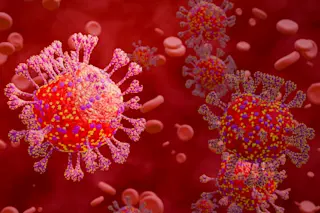Male circumcision cuts the risk of HIV transmission in men by about 60 percent and should be scaled up in countries hardest hit by the epidemic, the World Health Organization (WHO) announced in March, citing compelling evidence from three large trials in Kenya, Uganda, and South Africa.
Since the 1980s, dozens of smaller studies have suggested that countries with high rates of circumcision, like the Muslim nations of western Africa, have lower rates of AIDS, whereas southern* Africa, where circumcision is rare, has been ravaged by the epidemic. There, a 2006 study suggests, circumcision could prevent about 6 million HIV infections and 3 million deaths over 20 years. Still, the WHO held back its recommendation until 2007, citing the need for randomized clinical trials.
“Circumcision was ignored for ages,” says Daniel Halperin, an AIDS researcher at the Harvard School of Public Health, who laid out the case for circumcision in ...














